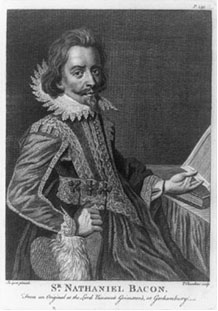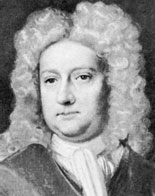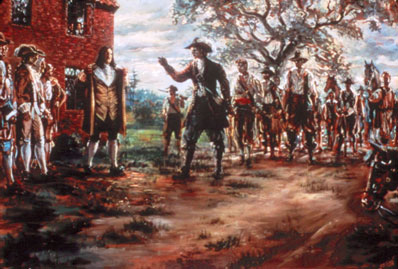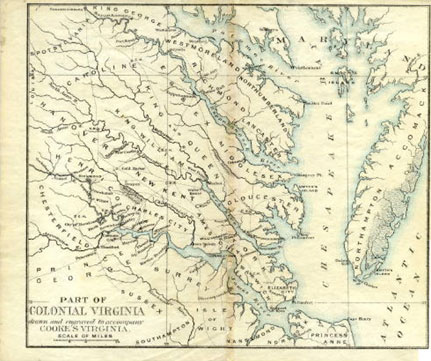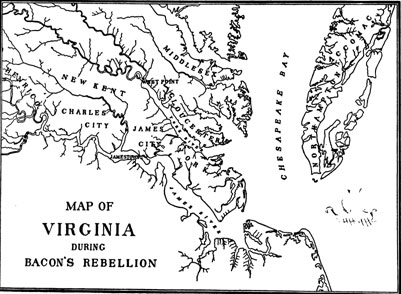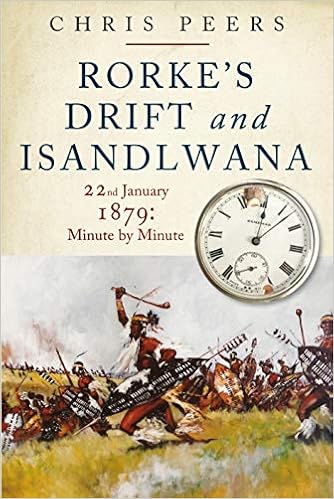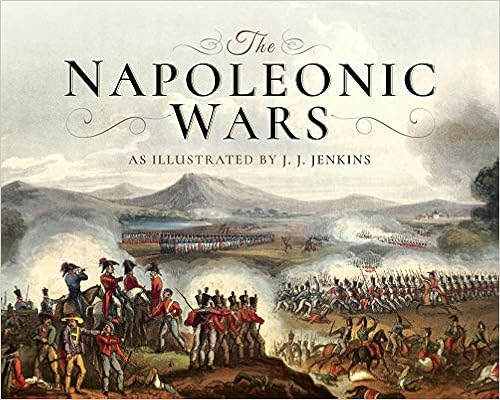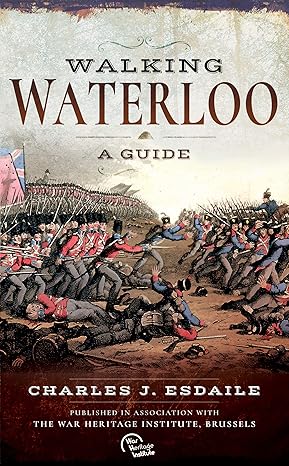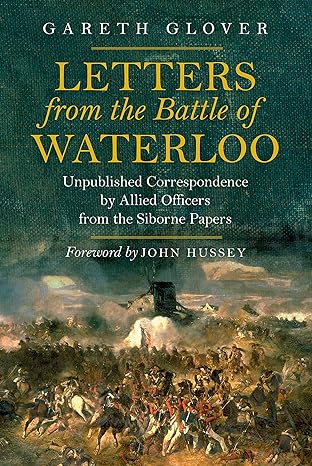Bacon's Rebellion: America's First Revolutionary?
By Walt Giersbach
Nathaniel Bacon was caught in a dilemma on a hot July day in 1676. The settlers’ avowed enemy, the Susquehannocks and their allies, were in front of him in the upper counties of Virginia while Governor William Berkeley’s English army and militia were getting ready to attack Bacon from the rear. Hundreds of landowners, indentured servants, slaves and other volunteers making up Bacon’s army waited for orders.
Ever the strategist, the 29-year-old rebel addressed his army, “Gentlemen and fellow soldiers, the news just brought to me may not a little startle you as well as myselfe. The Governour is now in Gloster County endeavouring to raise forces against us, having declared us Rebells and Traytors…. They had rather wee should be Murder’d and our Ghosts sent to our slaughter’d Countrymen by their actings, than we should live to hinder them of their Interest with the Heathen.” [1]
The aristocratic plantation owner and self-declared “General by Consent of the People” turned his army back to Jamestown—better to attack the Governor at once than have him hit them from the rear while engaged in the woods with the tribes.
Mistakes on Every Side
It’s difficult to look at 17th century American history without interpreting the clash of cultures as “grasping Europeans annihilating the Native American” or “angry savages attacking innocent settlers.” Bacon’s Rebellion, in 1675-76 Virginia, however, presents a complicated case of economic confusion, anti-authoritarian sentiment by colonists, grievous errors made by Virginia’s governor, and resentment by Native Americans.
Hundreds of whites and Native Americans died, Jamestown was burned to the ground and the colonial government was in disarray before the Rebellion ended. It was a needless war that no one won and didn’t need to be fought. The conflict may also have sown the seeds of independence a century before the American Revolution.
Years of Horrifying Hardships
Virginians in the 1670s endured a multitude of problems. Tobacco prices were depressed when colonists were forbidden to sell to French customers and Dutch ships were blocked from trading with Virginia. Virginia’s House of Burgesses established perpetual slavery for blacks, but costs of growing tobacco still were higher than other crops. Maryland and the Carolinas were competing commercially against Virginia, the English market was constricting and finished goods from England were rising in price. The English Crown was paying for heavy losses in their naval war with the Dutch. On the Eastern seaboard, hailstorms, floods and hurricanes devastated the colonies. And politically, Governor Berkeley had co-opted the Council and avoided calling for new elections to the House of Burgesses. [2]
While frustration ran high, Virginia’s elderly governor, Sir William Berkeley, was popular with King Charles II for evicting non-conformist Puritans and defeating the Dutch at what is now Wilmington, Delaware. He had also granted the Powhatan Indians rights to land near the York River. This bit of diplomacy brought peace, but at a price. Europeans, arriving in Virginia hoping to find cheap land, were upset to find the most prized land off limits. [3]
In July 1675, a number of Doeg Indians raided Thomas Matthews’ plantation in the Northern Neck of Virginia near the Potomac River. Matthews supposedly had not paid for something he had obtained from the tribe. Several Doegs were killed in the fracas. This hadn’t been the first such Indian conflict, but tensions now reached a flashpoint. [4]
In retaliation, colonists struck back. Nathaniel Bacon, a planter, rose as the natural leader of the outraged Virginians. Leading a ragtag group of angry farmers, slaves and indentured servants who had escaped from their masters, Bacon assaulted the Indians. [5] Unfortunately, the Virginians attacked Susquehannocks—perhaps the wrong tribe, but one which had ventured into Virginia and occupied the desired land. [6]
The Susquehannocks struck back, killing 36 colonists to avenge their previous attack. [7]
Governor Berkeley sharply condemned the attacks, seeing a dangerous escalation of tensions as well as an undoing of his diplomatic overtures in the new land.
Berkeley was probably outraged as he rode into Bacon’s homestead at Henrico with 300 militia. Bacon, wisely, fled into the forest with some 200 volunteers, perhaps searching for a more equitable meeting place. Frustrated, the governor issued two petitions that declared Nathaniel Bacon a rebel but pardoned the volunteer Indian fighters if they returned home peacefully. Bacon would be given a fair trial for his disobedience, Berkeley stated, but would certainly be relieved of his Council seat.
Bacon’s response was to attack an encampment of Occaneechee Indians on the Roanoke River between Virginia and North Carolina. The Occaneechee were enterprising people who were embroiled in their own squabble with the Susquehannocks. Bacon’s enemies now were not only Indians, but also soldiers of the king.
Power Struggle Between Strong Personalities
Born in Suffolk, England on Jan. 2, 1647, Nathaniel Bacon, Jr. had been called a troublemaker and schemer at home. His father, Thomas, sent him to the colonies in about 1672. His financial support allowed the 25-year-old man to purchase two estates on the James River. He settled at Curles, in Henrico County on the lower James. Intelligent and eloquent, Bacon was popular, but reportedly had no taste for labor. Coincidentally, Bacon was also related to the other chief player in the drama through the marriage of his cousin Lady Berkeley, Frances Culpeper. [8]
Sir William Berkeley (pronounced BARK-lee) was a veteran of England’s civil wars, had fought in the Indian wars on the colonies’ frontier and was a favorite of King Charles I during his first term as governor of Virginia in the 1640s. When the English civil war ended in 1660 and the monarchy restored under Charles II, Berkeley was reappointed governor. At his home in Green Spring Plantation in James City County, he experimented with growing silk worms to supplant the colony’s reliance on tobacco. [9]
But there was a darker side to the loyalist. He stated memorably, “I thank God there are no free schools, nor printing, and I hope we shall not have these hundred years; for learning has brought disobedience into the world, and printing has divulged them and libels against the best governments. God keep us from both!” [10]
Berkeley respected Nathaniel Bacon as a fellow aristocrat when the young man arrived in Virginia, giving him a land grant and a seat on the Council. [11]
Warfare, Personal and Political
Governor Berkeley immediately investigated the Doeg and Susquehannock attacks, hoping to preserve friendship with the tribes while pacifying the settlers’ tempers. But, when he set up a parley between the aggrieved parties, several tribal chiefs were murdered. Bacon refused to heed caution, disregarded Berkeley’s direct orders, and seized friendly Appomattox Indians for supposedly stealing corn. This resulted in an official reprimand from the governor. at attempting to compromise, Berkeley relieved the tribes of their powder and ammunition. Turning to the second problem of pacifying the colonists, Berkeley called a “Long Assembly” in March 1676. The assembly declared war on the “bad” Indians and created a defensive zone around the settlements with a military chain of command. (The ensuing war also led to high taxes to support the soldiers and resentment from the colonists having to pay for it.)
The Long Assembly’s bias led to a ruling over trade with the tribes. The favored traders, not coincidentally, were cronies and supporters of the governor. Independent traders, who had associated with the Indians for years, were no longer allowed to continue their commercial activities. A commission was created to oversee trade and ensure the Indians didn’t receive arms and ammunition.
Nathaniel Bacon was not one of the traders favored by this “Tidewater Aristocracy.” He was also angry that the governor denied him a commission in the local militia. This didn’t stop Bacon from accepting unofficial appointment as “General” by local volunteer Indian fighters. [12]
Governor Berkeley must have seethed at the insolence of a colonist demanding a commission, but knew it wouldn’t be prudent to absolutely refuse Bacon. He evaded the issue and sent representatives to persuade Bacon to disband. Bacon, for his part, had mustered a force of 500 men. He refused Berkeley’s order and marched to the falls of the James River.
On May 29, Governor Berkeley declared that everyone who failed to return would be termed rebels. Many of Bacon’s men—land owners whose property could be confiscated—heeded the declaration and disbanded. Bacon, left with just 57 loyalists, continued upriver. With their provisions nearly exhausted, the band stumbled into the Occaneechee tribe led by Persicles in its fort on an island in the north branch of the James River.
Persicles had accepted the Susquehannocks when the latter wandered in from the north, but they “being exercised in warr for many years with the Senecaes…endeavoured to beat the Ockanagees of their own Island.” Persicles was conferring with conquered Mannakin and Annelecton tribes people to surprise and cut off the Susquehannocks when Bacon appeared at the island fortress. [13]
Bacon tried to buy provisions, but the tribe put them off for days. In fact, Persicles insisted the English execute his Susquehannock prisoners, which Bacon refused to do. As the last of the food gave out, Bacon’s men waded across a branch of the river to the fort, whereupon one of his men was shot. Suspecting the tribe had colluded with Berkeley, the rebels stormed the fortification, blew up the Indians’ supply of guns and powder and killed 150 people, many of them defenseless men, women and children. The dead included Persicles, his wife and children. Three of Bacon’s party also lost their lives in the two-day fight before the small band dragged themselves back to their homes.
News of the victory was enthusiastically received in the frontier counties and the hero now became an idol. Nathaniel Bacon was soon elected one of the burgesses of Henrico County in defiance of Governor Berkeley’s proclamations. Going downriver to Jamestown to take his seat in the Assembly, Bacon wisely was accompanied by a friendly escort. Above the town, Bacon sent ahead to learn whether he would be allowed to take his seat. In reply, the Governor opened fire on the sloop from the fort’s guns.
Bacon sailed back upriver to the home of Richard Lawrence, a sympathizer where he, Lawrence and a William Drummond conferred for hours. Returning to his boat, Bacon was discovered, alarms were sounded and several boats with armed men chased after Bacon’s little sloop. By about three o’clock he was driven aground by the Adam and Eve and forced to surrender.
Bacon was taken to Governor Berkeley. The old man exclaimed, “Now I behold the greatest Rebell that ever was in Virginia!” He asked, “Mr. Bacon, do you continue to be a gentleman? And may I take your word? If so you are at liberty upon your parol.”
Bacon was set free, not because of the Governor’s magnanimity (he had told Bacon’s wife she would see her husband hanged) but because to do otherwise could set the entire colony upon revenge. Bacon’s companions who had been arrested, however, were kept in irons. [14]
Standoff Between Royalists and Rebels
Members of the new Assembly—including the duly elected Nathaniel Bacon—gathered in Jamestown on June 5 and listened to Governor Berkeley pontificate about the Indian massacres. “If they had killed my grandfather and my grandmother,” he exclaimed, “my father and mother, all my friends, yet if they had come to treat of peace they ought to have gone in peace.” There was a short recess before Berkeley began again, “If there be joy in the presence of the angels over one sinner that repenteth, there is joy now, for we have a penitent sinner come before us. Call Mr. Bacon.”
Bacon was then compelled to kneel in front of the burgesses and confess his offense, and to beg the pardon of God, the King and the Governor.
To this, Berkeley exclaimed three times, “God forgive you, I forgive you.”
Colonel Cole, a Council member, asked pointedly, “And all that were with them?”
“Yea,” Governor Berkeley answered, “and all that were with him.” He then said, “Mr. Bacon, if you will live civilly but to the next quarter court, I’ll promise to restore your place there,” pointing to Bacon’s seat. In fact, Bacon’s election was immediately restored and he was promised a commission—to be delivered in three days—to go out against the Indians. [15]
The commission didn’t arrive—possibly because the Assembly was confronting other matters. Governor Berkeley, believing all was quiet and that his pardon wasn’t morally binding, issued secret warrants to seize Bacon. Whether Bacon suspected hypocrisy or felt his work was done, he left Jamestown unaccompanied.
His old comrades in arms welcomed him home in Henrico County, believing he was officially commissioned to defend their territory and homes. When they learned he was once more a fugitive they “sett their throats in one common key of Oathes and curses and cried aloud, that they would either have a Commission…or else they would pull downe the Towne.” [16]
Rumors reached Jamestown on June 22nd that Bacon was approaching at the head of 500 very angry men. The ragtag army was made up of weatherbeaten frontiersmen, planters sunk deeply in debt, freedmen whose release from bondage brought little relief. There was no moderation and little reason in the mass of rebels.
Berkeley summoned the York “train bands” to defend Jamestown against Bacon’s presumed attack. (Train bands were local militia who trained in weekly drills.) Only 100 showed up—late—and half of them were rebel sympathizers. Four guns were dragged to Sandy Bay to cover the narrow neck of land connecting the peninsula to the left bank of the river. Messengers rushed to Jamestown, advising of the ad hoc army’s approach led by Bacon.
In the face of this apparently oIn the face of this apparently overwhelming threat, Governor Berkeley dismounted the guns, withdrew the soldiers and retired to the state house.
Confrontation at the State House
Four days later, at 2:00 in the afternoon, Bacon and his men—now numbering 600 on foot and horseback—entered the city without resistance. A file of fusiliers arrayed themselves on the green before the state house.
Half an hour later, a customary drum tattoo called the Assembly to order. Two Council members demanded to know what Bacon wanted. Bacon answered that he had come for a commission as general of volunteers enrolled against the Indians, and that his men would refuse to pay levies for new forces.
Angrily, Governor Berkeley signed a commission and presented it. Bacon read it to his soldiers and declared that the powers were insufficient. Bacon drew up a new paper, indicating his loyalty to the king and the legality of his past actions and appointing himself general of all the forces in Virginia used against the Indians.
This threw the aged governor into a rage and he refused to sign the commission. Berkeley, dramatically baring his breast before the armed rebels, cried, “Here! Shoot me, ’fore God, fair mark. Shoot!”
Bacon replied, “No, may it please your Honor, we will not hurt a hair of your head, nor of any other man’s. We are come for a commission to save our lives from the Indians, which you have so often promised, and now we will have it before we go.” Bacon strode back and forth before his men, holding his left arm akimbo, gesticulating violently with his other arm and muttering “new coyned oathes.”
The Governor and Council members withdrew to his private apartment at the other end of the state house. Bacon rushed after him, his hand moving from sword hilt to his hat, followed by the fusiliers with their guns cocked. They shouted at a window, “We will have it! We will have it!”
A burgess well-known to them appeared at the window, waved his handkerchief and exclaimed, “You shall have it, you shall have it!”
The fusiliers uncocked their guns and lowered them as Bacon returned. It was reported that Bacon had earlier ordered his men to fire in case he drew his sword, which explained his nervous gestures. An hour later, Bacon entered the Assembly chamber and received the commission authorizing him to march against the Indians. [17]
A new humiliation awaited the Governor the next day as Bacon returned to the House of Burgesses with an armed guard, demanding that certain persons obeying the Governor’s orders be removed from office and that letters to the king denouncing Bacon as a rebel be publicly contradicted.
Berkeley swore he would rather be killed than submit. The Burgesses, who likely thought their throats would be cut, advised the Governor to grant Bacon whatever he wanted. Shortly, a letter was written to the king and signed by Berkeley and the Burgesses attesting to Bacon’s loyalty and justifying his actions, several Berkeley cronies were assigned to prison, blank commissions were written for officers to command under Bacon—any and everything Bacon wanted was granted “as long as they concerned not life and limb” [18]
Giving in to the Rebels
Berkeley’s capitulation allowed Bacon to fight the Indians wherever and whenever he desired without interference. With this, the Governor lost all claim to authority and Bacon’s Rebellion was in full force.
Standing now at the head of a thousand men, Bacon marched against the Pamunkies, killing many and destroying their camps. Meanwhile, the loyal colonists in Gloucester—disarmed earlier by Governor Berkeley—petitioned for protection. Berkeley responded with animation, hurrying to the town proclaiming Bacon a rebel and a traitor. He summoned militia from throughout that county and Middlesex—some 1,200 men—proposing that they pursue Bacon and arrest him.
He was greeted by shouts, “Bacon! Bacon!” They withdrew from the field, leaving the humiliated Governor to ponder the chasm separating the people and their government.
Bacon, nearing the York River, heard of the situation in Gloucester. He stated that “it vexed him to the heart that while he was hunting wolves which were [presumed?] innocent lambs, the governor and those with him should pursue him in the rear with full cry, and that he was like corn between two millstones, which would grind him to powder if he didn’t look to it.”
He marched back to Gloucester on July 29th. Berkeley, knowing he had been abandoned, escaped with a few friends across the Chesapeake Bay to John Custis’s house in Accomack County on the Eastern Shore—safe in knowing Bacon’s army hadn’t the boats to follow him.
During this pause in the confrontation, Bacon was faced with a quandary. He could fight, knowing the terrain and new methods of unorthodox fighting would make 500 Virginians the equal of 2,000 Red Coats. He could also appeal to the Dutch or French for assistance. But the people would not openly refute their ties of blood, religion and language to their mother land of England. He had to deceive the people with a pretence of loyalty, take an oath of allegiance and demand it of his followers—even, absurdly, that it was in the crown’s interest to disobey a king’s order, arrest his governor and fight his troops. To succeed, he knew, he had to seduce the wealthy planters, and so called at least 69 influential plantation owners to his home at Middle Plantation on Aug. 3, 1676.
Haranguing, wheedling and cajoling them—even locking the doors against their departure—Bacon made them sign three oaths: to assist him in fighting the Indian war, to resist all attempts of the Governor to raise troops against him, and to resist His Majesty’s troops until Bacon could bring his cause to the attention of King Charles II. This last was a contentious sticking point. [19]
As “General by Consent of the People” now, Bacon issued his Declaration of the People the next day. [This classic statement of grievances is printed below.]
Although this statement seems classic in foreshadowing the Declaration of Independence a century later, it must be remembered that Bacon wrote it without consulting anyone. He probably had strong support from the rank and file, since about 70 of the 600 men who rallied to the cause were black. [20]
Bacon also undertook civil administration at this time. With four members of the Council, he ordered the election of a new Assembly on Sept. 4th in Jamestown. Uppermost in his mind was the fight on two fronts. His men seized the English ship lying in the James River, impressing Captain Larrimore and her crew to secure his back. This vessel, along with a sloop and a bark with four guns, were placed under the command of Captain William Carver and Gyles Bland to patrol the Western shore.
Attacking on Two Fronts
Bacon simultaneously turned to renew his attack against the Occaneechees and Susquehannocks. For some reason, his attention was turned to the Pamunkeys. Crossing the James to the York River, he met with Colonel Gyles Brent with reinforcements from plantations on the Potomac and Rappahannock. The small army was fired upon by the Pamunkeys, who then fled into the swamps—except for one woman and her child. They then found an elderly nurse of the Pamunkey queen, forcing her to be their guide. The wily woman, unwilling to betray her people, led them far astray. Angry at being taken miles from their quarry, he ordered the old woman knocked in the head and killed.
The army then wandered randomly, following one lead and then turning to another, all the time realizing the Assembly would meet shortly in Jamestown. A tired and discouraged army begged Bacon to take them home, but he resolved that he would rather die in the woods, living on chinquapins and horse flesh, than betray the confidence placed in him. As the army split—half to remain and half to return home, Bacon’s group floundered into the main camp of the Pamunkeys. The enemy was surrounded by swamp on three sides, but fled as the English charged in. Securing his plunder and captives, Bacon and his men turned back to the plantations. [21]
Disgruntled, Governor Berkeley remained at his home at Green Spring trying to ignore the problem Bacon presented. But, by September, he had regained his spirit.
Captain Carver had arrived at the coast of Accomack and went ashore under a flag of truce. Bland and his men remained on board to guard the ships and Larrimore’s sailors. Larrimore somehow managed to get a message to the Governor, urgently requesting rescuers. Berkeley dithered; was it a trap? Desperate, he liberally “caressed Carver with wine” to delay him while 26 men under Colonel Philip Ludwell sneaked out to Larrimore in two small boats. Ludwell’s men entered Larrimore’s boat through an open gun port. One soldier put a pistol to Bland’s heart, saying “You are my prisoner.” The rest of the company followed, while Captain Larrimore and his crew grabbed spikes to help. The rebels surrendered immediately. Carver returned unsuspecting, was immediately tried for treason, condemned and hanged. [22]
Seizing the moment as a turning point, Berkeley felt strong enough to retake Jamestown and fortify it. The Indian fighting continued and Bacon was nowhere in sight as the date of the Assembly approached. Bacon’s friends had left Jamestown and it was occupied now by the governor’s sympathizers. Berkeley arrived on Sept. 7 on Captain Larrimore’s ship, with the Adam and Eve and 16 or 17 sloops. Colonel Lawrence’s house was seized the next morning, “with all his wealth and a faire cupboard of plate standing, which fell into the Governor’s hands.” He and his army, crossing the James River at his own house at Curles, surprised a band of Appomattox Indians who lived on both sides of the river. The militia killed a large number of people, scattered the rest and burned the village. Moving southward, he then destroyed tribal towns on the banks of the Nottoway, Meherrin and Roanoke. Indians fled in advance, often without food.
Having exhausted their own provisions, Bacon dismissed a large part of his forces. At this point, he learned of the governor’s return to Jamestown. Infuriated, Bacon collected a force—estimated variously as 150, 300 or 800—from New Kent and Henrico, informed them of the situation and quickly marched them and the Indian captives to Jamestown.
Attack on the Capital City
Jamestown had been fortified with a “palisade ten paces in width, running across the neck of the peninsula” and defended with three large guns. The ships had been laid broadside, bringing their guns to bear on the probable attack. In town, the forces numbered a thousand men—three times the force Bacon could bring.
Jamestown contained a church and some 16 or 18 brick houses. The population had been reduced to about a dozen families. Within the besieged town, the Governor hoped Bacon’s troops would run out of food and force the rebels to retire from the field. For his part, Berkeley had supplied his troops from his home three miles distant.
In this tense standoff, Bacon executed an unthinkable and ungentlemanly tactic. Small parties of cavalry captured the wives of several loyalists. His captives included the wife of his cousin Colonel Nathaniel Bacon, Sr., Madame Bray, Madame Page and Madame Ballard. He singled out one lady to return to town with the warning that the women would be put on the ramparts as shields if the governor attacked.
An outraged Colonel Philip Ludwell fulminated that the rebels were “ravishing the women from their homes, and hurrying them about the country in their rude camps, often threatening them with death.” More probably, Bacon used the shield tactic only as a threat. He was busy having his men build earthworks around the Governor’s fortification.
On Sept. 16th, a lookout standing on a rooftop announced the rebels were going attack. Six or seven hundred English troops were ordered to storm Bacon’s redoubt—but many were there by compulsion with no heart for fighting.
General Bacon rode along his hastily constructed breastwork, reconnoitering the Governor’s position. Dismounting, he addressed his men to advance, had a trumpet sound the attack and ordered them to fire.
With the first volleys from the rebels, the English turned and fled. They marched out “like scholars going to school,” reported one chronicler, “but returned with light heels.” The mortal losses were small—12 men were killed in the attack—but the English humiliation was incalculable. It was reported, “Soe great was the Cowardize and Baseness of the generality of Sir William Berkeley’s party that there were only some 20 Gentlemen willing to stand by him.” The captive ladies went back on top of the earthworks in view of their husbands and friends in town. [23]
The Governor, realizing the enormity of his defeat, stole away in the night with his sympathizers after nailing up the guns and leaving the houses empty.
Bacon stormed Jamestown on Sept. 19th. At this moment, news came that Bacon’s former ally Colonel Brent had collected troops in the counties bordering the Potomac and would march with a thousand men to assist Berkeley. If this happened, and supported by the fleet, Bacon would be cut off in Jamestown. In his anger, he determined to burn Jamestown, saying there would be no more sanctuary there. His leaders agreed. Richard Lawrence and William Drummond, who owned two of the best houses, each set fire to their own homes as examples. The soldiers fired the rest of the community, including the church and statehouse. [24]
Bacon’s forces marched to the York River, crossing at Tindall’s Point (Gloucester) to confront Colonel Brent. Many of the Virginia soldiers, sympathizing with Bacon’s success, deserted the army. Bacon stopped and set up a headquarters at Colonel Augustine Warner II’s homestead where he called a convention in Gloucester. (Warner, a member of the House of Burgesses, was a loyalist and may have been agitated by the visitors.) Here he administered his oath of allegiance to the people of the county and began planning another expedition—either against the Indians or the Governor’s troops in Accomack.
Beginning of the End
The influential plantation owners were now withdrawing their support—even drawing to the Governor’s side. Further, the king’s troops would shortly arrive in Virginia. With no navy and no army, Bacon was doomed.
In the midst of this planning, Nathaniel Bacon fell ill with dysentery and retired to the house of a Dr. Pate in Gloucester County. The loathsome disease was called the “bloodie flux” and “lousey disease” (body lice). Delirious in the following days, he often cried out, asking if the guard around the house was strong or if the king’s troops had arrived.
The debacle of anarchism—or popular heroism?—came to an abrupt end on Oct. 26. Bacon was dead at age 29. His body was disposed of and never found. It’s possible that the contaminated corpse was burned by soldiers—or that they hid it so his remains wouldn’t be desecrated. His death, however, was remembered by the doggerel, “Bacon is Dead I am sorry at my hart That lice and flux should take the hangman’s part.”
He was succeeded—for a very short while—by his Lieutenant General Joseph Ingram. Ingram has been called a man of low birth, a dandy and a fool even though he showed military skill against the Governor. In any case, it is doubtful any rebel army could have held out against English Red Coats and sea power. [25]
Hearing of Bacon’s death, Governor Berkeley returned to reclaim his government. He had sent to England for more troops, which set sail Nov. 24, 1676. The remainder of the fleet left on Dec. 8 and 9. The Bristol, under Admiral Sir John Berry and Francis Moryson, sailed up the James River Jan. 29, 1677, with the other forces arriving between Feb 1 and 14. Governor Berkeley used these forces in exacting revenge. Among his first acts was to hang leaders of the rebellion—some 23 men. He seized rebel property without benefit of trial. Finally, an outraged Assembly insisted that the executions and reprisals stop.
Berkeley’s excessive reprisals were not greeted pleasurably in England. An investigating committee there reported to King Charles II. Berkeley was relieved of his Council seat and recalled to England. He sailed for the mother country on Apr. 20. In August, Berkeley died in England without ever having seen the king. [26]
This ended one of the strangest chapters of colonial American history. Latter-day interpretations call Bacon’s Rebellion the first cry of independence against British authority. Certainly, Virginia’s laws weren’t effective in dealing with economic or civil problems. At its heart, however, the rebellion may best be called a power struggle between two very strong personalities that resulted in the destruction of Jamestown and the death of hundreds of colonial rebels, Indians, military forces and colonists.
| * * * |
Show Notes
| * * * |
© 2026 Walt Giersbach.
Written by Walter Giersbach.
About the Author:
Walter Giersbach’s fiction has appeared in a score of online and print publications. He also writes extensively on American history, with 10 pieces published in Military History Online. Two volumes of short stories, Cruising the Green of Second Avenue, published by Wild Child (www.wildchildpublishing.com) were available from online retailers until his publisher ceased operations. He served for three decades as director of communications for Fortune 500 companies, helped publicize the Connecticut Film Festival, managed publicity and programs for Western Connecticut State University’s Haas Library, and moderates a writing group in New Jersey.
* Views expressed by contributors are their own and do not necessarily represent those of MilitaryHistoryOnline.com.

